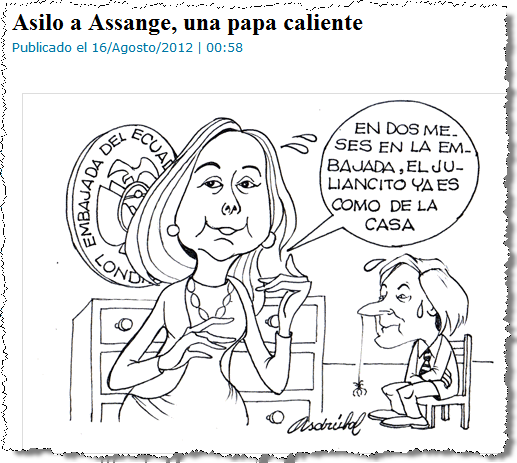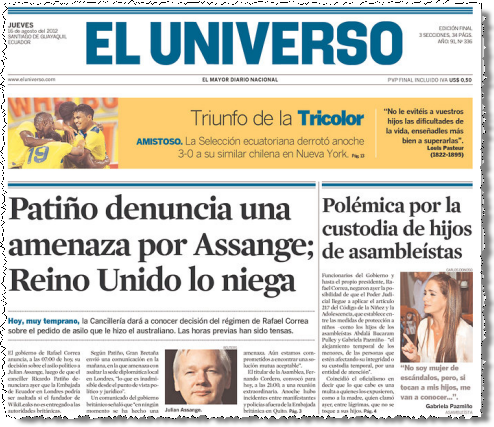There’s no doubt Ecuadorian president Rafael Correa, as Spanish speakers put it, is a man with “cojones”.
In 2009, he gave an almighty middle-finger salute to America by closing down the US air base in the port city of Manta. In 2010, during a debate with striking police officers, the left-wing firebrand thundered: “I’m not taking one step back. Gentleman, if you want to kill the president, here he is, kill him if you have the guts.” The police, in turn, took him hostage in a police hospital and Correa only managed to escape thanks to the efforts of an elite special rescue team.
Now, he’s taken another huge gamble by giving the green light to Julian Assange’s bid for asylum in Ecuador — a decision with potentially calamitous consequences for Quito-London relations. What on earth is the president up to?
According to Latin America experts interviewed by Crikey, the Ecuadorian government’s decision has little to do with the Swedish allegations against Assange — or the UK. It’s all about striking another blow against American imperialismo.
“Correa wants to promote himself as a champion of Latin American independence and autonomy,” said John Minns, director of the Australian National University’s centre for Latin American studies. “The general trend for Latin America — which Correa is central to, despite Ecuador’s small size — is turning away from links to the western hemisphere and America. The Assange case is symbolic of that. This is a way of showing up the US.”
Assange and Correa also appeared to get along like old pals in a TV interview earlier this year, which helps explain their alliance.
Minns says the UK’s decision to deliver an “aide-memoire” to the Ecuadorian embassy — pointing out that it is legal for British police to enter a diplomatic mission — appears to have backfired. “If the government hadn’t granted Assange asylum it would have been seen as a backdown in the face of a larger power,” he said.
Minns, who recently returned from a trip to Ecuador, says the stoush is likely to play out well for Correa, who’s up for re-election early next year. “It plays very well domestically,” he said. “It’s not a desperate move at all — it’s a move from a position of strength domestically … There’s no question he’s very popular.”
Barry Carr, a visiting professor in Latin American studies at New York’s Fordham University, is more cautious about Correa’s high-risk, high-reward approach.
“If Britain were to revoke Ecuador’s diplomatic status and enter the embassy that would be a huge boost to Ecuadorian nationalism — it would be a win for Correa,” he said. “But on the other hand he is not entirely safe. The conservative groups in Ecuador — the oligarchy — do not like Mr Correa. How he handles the situation and how the elites handle it will determine if he comes out smelling sweet or not. It’s not inconceivable that it could be used to destabilise him. I used to rule out the possibility of coups in Latin America, but I don’t any more. If I was Mr Correa I’d be watching my back very carefully. ”
There are also real risk for the Brits, Carr said: “Ecuador is a small country with no real economic or strategic significance for Britain. But the UK has been trying to boost its presence in Latin America in recent years. I’ll be watching closely what Argentina, Bolivia, Brazil — the new great power of Latin America — say over the coming days.”
It has been widely noted that Correa has a fractious, and far from unblemished, relationship with the press and human rights groups. The government recently closed down 11 radio stations and Correa sued a conservative newspaper, El Universo, for $US40 million in damages after it published an article blasting him for his actions during the 2010 coup. Ecuador also expelled the US ambassador in Quito, Heather Hodges, after WikiLeaks published a US diplomatic cable alleging widespread corruption within the nation’s police force.
Yet Carr says Correa — a Catholic academic economist who spent four years living in the US — shouldn’t be stereotyped as a despot. “The notion that he’s hell-bent on destroying press freedom is not supported by the evidence,” said Carr. “If you were ranking the press from 0-10 on a basis from tolerance to repression, you’d probably put Ecuador at about a three or four.”
Not surprisingly, Hoy and El Universo — two major papers that have been sued by Correa — have been less than glowing in their reporting of the overnight drama.
In the papers, there is patriotic anger at the UK’s apparent threat to storm the embassy, a feeling of being put upon by western superpowers, and some sympathy for Assange.
But this is tempered with caution about the risks to Ecuador of taking on Assange’s cause, combined with a healthy dose of scepticism about why Correa has gone in to fight for “al hacker australiano Julian Assange”. Australia comes in for a little criticism for failing to help Assange, although the main targets in the media’s sights are the UK and the US. Commenters on stories have raised the sensitive topic of “las Malvinas” — the Falklands — and there is plenty of chatter under the Spanish-language Twitter hashtag #AsiloAssange.
Here’s how the daily newspaper Hoy has greeted the president’s decision to grant asylum to Assange — “a hot potato”:

The caption reads “in two months at the embassy, little Julian is right at home”. In this cautious analysis piece, Hoy says:
“It’s a delicate decision that has to be taken with the greatest responsibility and without affecting the interests of the country. It’s a hot potato for the president who showed his sympathy for Assange with curiously welcoming him to ‘the club of the persecuted’ to close the TV interview with with the famous hacker.”
The piece also questions the evidence that Assange needs asylum: “The difficulty is to demonstrate the objective relationship between the process for alleged s-xual abuse and the eventuality of an extradition and trial for criminal charges that have not yet been clarified by the US.” It concludes that Assange might be in the embassy for a long time.But in another piece, a more bolshie Hoy canvasses possible embassy escape routes:
” … Assange is protected from arrest if travelling in a diplomatic car, but the embassy is on the first level of a building that is guarded by police day and night. The building is located behind the department shop Harrods, and houses the Colombian embassy and private apartments. A police car is outside the main entrance. The property has various entrances and a private car park, but the Ecuadorean embassy is not connected internally with any of them, making the main door the only exit point.”
Hoy writes that Ecuador is rallying other South American states to help Assange leave the UK, with Argentina, Bolivia, Uruguay and Paraguay accepting. The piece quotes the Ecuadorean government saying that Assange “que tampoco cuenta con el auxilio de su pais de origen, Australia” (“cannot count on the support of his country of origin, Australia”).
An analysis in El Universio asks: “Con el asilo a Assange, ¿qué gana o pierde Ecuador?” (“with the Assange asylum issue, what does Ecuador win or lose?”). It points to the risks of defending Assange, noting that relations with Europe and Australia are jeopardised. “The decision to grant asylum to Assange has profound diplomatic implications and could affect relations with countries like the UK, Sweden and the US,” the piece says. A commentator is quoted: “I don’t see a single positive outcome for Ecuador in conceding asylum to Senor Assange”.
But the piece does outline some positives, noting that the decision will be well-viewed by left-leaning South American states. It finishes with a swipe at President Correa:
“Critics point out that Assange, considered as a defender of the freedom of information, is seeking asylum in a country where the government does not grant interviews with major national news outlets and which has has sued journalists, editors and newspaper owners for ‘defamation’ against them.”








It seems to be de rigueur for geostrategy wonks like the authors to bury issues in their irrelevant terms, but just MIGHT there be actual principles involved, principles relevant to the 99% and not just to the 1%? Could the authors not conceive of the possibility that a Latin American leader, unlike US and UK leaders guided only by colonial interests, just MIGHT act on them?
I would be surprised if Correa didn’t consult with his Latin American counterparts before coming to his decision. It’s a brave decision given the US’s obvious willingness to institute or support coups or even assassinations on that continent.
And Dion I think you are right that Correa is guided by principles. In Australia along with the UK and US foreign policies have long been principle free. In Sweden too it seems principles no longer count especially in dealings with the dreaded empire.
The jeopardisation of relations with Australia is a complete furphy.
Unfortunately Australia’s foreign policy designers have studiously excluded the development of financial and economic relations with the ALBA countries, which is becoming a major economic force in the autonomous development of the Latin American economies. A look at the reports of Australian Joint Parliamentary Committees involving engagement with Latin American countries show that DFAT only looks at relations with Chile, Argentina, in some cases Colombia, occasionally Mexico and the (mostly English speaking) Caribbean countries.
The focus on Chile and Argentina will come round and bite them on the bum, as more and more of the ALBA countries become integrated with MERCOSUR – a kind of South/Latin American free trade agreement that counterbalances the various NAFTA (North American Free Trade Agreements) and ‘CAFTA’ (Central American Free Trade Agreements) from which Australia, if not prepared to look it in the eye without anglophile or eurocentric attitudes will be excluded.
It would be wise for our politicians not to be too snooty or smug about Ecuador. Or for that matter, Assange.